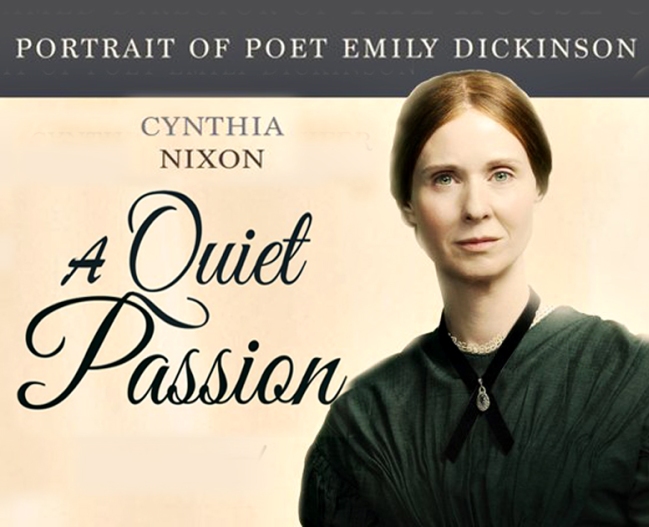 June
29
June
29
Tags
A Quiet Passion (2016)

Modern cinema is dominated by genre formulas so it is refreshing to find something different. A Quiet Passion (2016) offers unconventional cinematography, direction and narration in a film that often feels like an extended poem. It will not be to everyone’s taste, but for those with a curiosity about the gifted melancholic Emily Dickinson (1830-1886) it is a finely crafted portrait of one of America’s most revered poets.
The story unfolds within a traditional bio-pic narrative structure. We meet the young schoolgirl Emily (Emma Bell) who, from an early age, is fiercely rebellious with anyone who would impose their ideas and values upon her. Born into a prominent Puritan family in Amherst, Massachusetts, she privately indulged her passion for writing verse at a time when women were never published. After the death of a close friend, she became obsessive about mortality and her poetry darkened with angst and melancholy. The mature Emily (Cynthia Nixon) was in awe of her attractive sister and she became acutely self-conscious, developing what today might be described as depressive agoraphobia. Highly judgemental of the foibles and faults of others, she was reclusive to the point where she refused to go outside and would only talk to visitors if she was not visible to them. Despite, or perhaps because, of her complexities she wrote 1800 poems but few were published in her lifetime. Beautifully filmed with detailed period sets and costumes, this sumptuous production conveys a dark mind lightened by only by her intelligent wit.
Admiring the cinematic qualities of this film is not the same as expressing enjoyment. It exudes a joyless austerity through its colour palette and framing, and the use of prolonged fixed camera takes feels excessive. There are several excruciatingly slow 360 degree pans that show little more than the banality of time and the emptiness of space in Emily’s lonely world. Many scene changes and time lapses have a jarring abruptness that might mimic a restless mind but are also distracting. The script of this dialogue-rich film sounds forced, with every second line intended as pithy high-brow banter, and many of the set-piece scenes are symmetrically framed to evoke the formalism of 19th century portraiture styles. Perhaps the biggest gamble taken in this film is the overlaid narration of Dickinson’s verse to amplify or deepen screen moments. If you are familiar with her work then the poetry narration may add layers of meaning, but for others its density is challenging when spoken at length.
The purpose of any bio-pic is to shed light on significant people in history. For Emily Dickinson, this can only be done by entering the prism of a complex and troubled mind that found solace and expression in verse. Cynthia Nixon gives a tour-de-force performance across the wide emotional range of a creative genius trapped in a world ill-suited to her intellect and gender. The film achieves much by creatively merging its medium and message. Its greatest achievement is to pay homage to a literary giant for audiences unfamiliar with her work.

Director: Terence Bell
Stars: Cynthia Nixon, Emma Bell, Keith Carradine
A UK & Belgium production

Sounds like a mixed bag, but even though I have long known of Emily Dickenson I don’t actually know her poetry well, so would probably get something out of it. But! Doesn’t look as if it is coming to the Illawarra, and I guess definitely not in school holidays … sigh …
LikeLiked by 1 person
I’m ambivalent about this film. There is much to enjoy and learn about Dickinson, and some of the poetic narration strikes a deep cord. But it could be described as over-long and over-wrought. Still worth tracking down at some time Gwen.
LikeLike
(Off-topic, but similar bio-pic stuff) There was supposed to a film in the making about John Ruskin, or perhaps, more specifically, his wife. I heard about it in England a few years back but never saw it advertised here. Have you come across that one?
LikeLiked by 1 person
I think you are referring to the film Effie Grey (2014) described as “a scandalous love triangle between Victorian art critic John Ruskin, his teenage bride Effie Gray, and Pre-Raphaelite painter John Everett Millais”. I’ll track it down as it sounds interesting. Thanks for mentioning it.
LikeLiked by 1 person
That sounds like it. I came across it in the pipeline on a visit to his house when I was in the Lake District. Intriguing story.
LikeLiked by 1 person
Its available on iTunes; will see it soon.
LikeLiked by 1 person
Based upon your review I’ll be looking for this one. Sounds like there’s a lot to like about it, despite its blemishes. I do tend to get frustrated with films that depict that era, particularly if they are told through the eyes of a woman. I would not to well as a woman during much of our earlier history.
LikeLiked by 1 person
I’m surprised at how many of these period dramas are being made at present. There is obviously a receptive audience. If they are also a biopic they tend to be good history pieces. This one has the added interest of poetry as a voice of early feminism.
LikeLiked by 1 person
I think people are striving to look backwards for a time that at least appeared to be safer, more sane; Although, in reality, there were just as many problems, just different problems.
LikeLiked by 1 person
You have nailed it: the world is more turbulent now than in recent decades. I’m waiting for the first wave of The Donald Era films.
LikeLiked by 1 person
After reading your review, I may check this out. Thanks for bringing it to my attention.
LikeLiked by 1 person